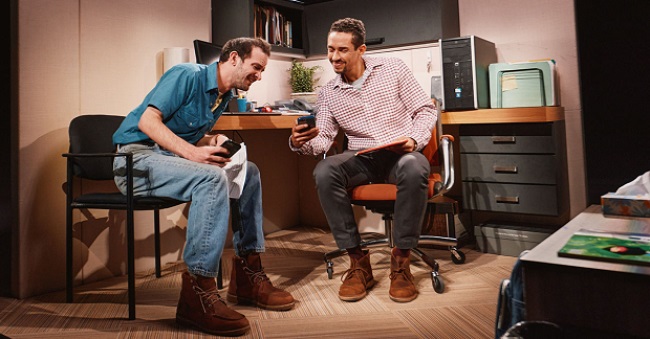In A Case for the Existence of God, I observed two individuals sitting for a long time and thought about how sedentary my own life had become. I sit around all day doing nothing productive on my desk or couch. Are you working, watching TV, and waiting for the wonderful release of death?
When that happened, it turned really gloomy. So, too, does Samuel D. Hunter’s delicate yet ambitious two-hander, which, over the course of 90 minutes, charts the entwining of two strangers’ souls.

The men’s sat attitude takes on an existential gloom after a while, representing apathy, immobility, and melancholy. When one of them stands up angrily, it’s if a lightning bolt has struck the stage.
Read Also:
- Max Scherzer Leaves Early with Discomfort in Mets Win
- Dallas Mavericks will Beat Unlikable Phoenix Suns in Seven Games
- Tongan Athlete Pita Taufatofua makes Shirtless Return to Olympics
Contents
A Case for the Existence of God Play Review
Will Brill’s Ryan and Kyle Beltran’s Keith are squished into the cubicle that Keith shares at their Twin Falls, Idaho, mortgage brokerage firm.
Arnulfo Maldonado’s corporate-island-in-a-desert set features a flimsy wall and desk arrangement that can be transformed into several locations with nary a moved fern or stapler, while Tyler Micoleau’s expert lighting gets a workout in creating time and place.
When picking up their toddlers from daycare, Ryan and Keith crossed paths. Ryan set up a meeting with Keith after learning that he works in the mortgage industry.
It’s not immediately clear to Ryan what role Keith plays between the bank and himself as a broker, so Keith spends some time explaining the distinction (like a priest to a penitent). Twelve acres of land that Ryan’s mentally unstable great-grandfather owned almost a century ago have caught Ryan’s eye.
It’s puzzling why Ryan would want to take back such cursed territory, but the recently divorced father with precarious finances is looking for stability and a place to call home.
Keith, too, is seeking to make a claim in the years to come; he is the foster father to Willa, the daughter of a meth addict, and his hopes for a happy future rest on her eventual adoption.
But under Idaho law, a child’s own family can seek custody, so Keith constantly worries that his daughter will be removed from him.
Given that Keith is both black and gay, he and Ryan may experience some little tension. Keith, who has a more extensive education than Ryan (he majored in Early Music and English in college), occasionally causes slight delays by employing phrases like “harrowing” and “tacitly,” which leave Ryan bewildered for a moment.
Hunter, Like any Good Dramatist, Strategically Distributes Character Information.
Midway through, he throws a curveball by revealing that the male protagonists had known each other since high school. Hunter, with the patience of a novelist, introduces us to their histories and gradually brings them together.
As Ryan comes to terms with the fact that he has no rights as a gay foster dad, his resentment of Keith’s affluent upbringing subsides. Keith recognises the challenges Ryan has due to his family’s history of poverty and mental illness.
Both are under such intense stress that even a friendly offer of a hug can set off an outburst of wrath. (You may have squinted at the skeleton of the story, like I did, and misread it as an allegory: Ryan is the Old Testament, and Keith is the New Testament.)
Director David Cromer,
He demonstrated earlier this season with an entirely different piece, the huge, multi-pronged family epic A Prayer for the French Republic, is a master of focus and stripping down moments to their fundamental pith and conflict.
He uses the deft touch of an anesthesiologist to manipulate the text’s intensity of emotion and, by extension, the reader’s sympathetic response.
This superbly conceived performance presents us with a world that is both lifelike and epic in spiritual scale, thanks in large part to Brenda Abbandandolo’s subtly distinct layers of contemporary casual and Christopher Darbassie’s haunting sound effects.
By the end, Cromer and his team have given up on the cube and instead reimagined it as a rock formation they can scale to see the world from a different perspective.
Read Also:
- How Many Sinister Movies Are There
- Who Played the Scarecrow in the Wizard of OZ
- Will Smith on King Richard and His Secret Career Fear
Conclusion
The imposing title of A Case for the Existence of God irritated me even the day after I saw the film. It was a large hat for such a little cowboy. The dissonance of the term is heightened if you don’t believe in a higher power.
However, if Hunter had substituted the word “love” for “God,” I would have no problem with it because love is also an abstract concept. I think we can all agree that if two shattered people can overcome their fears and find solace in each other, then perhaps there is something holy among us.

